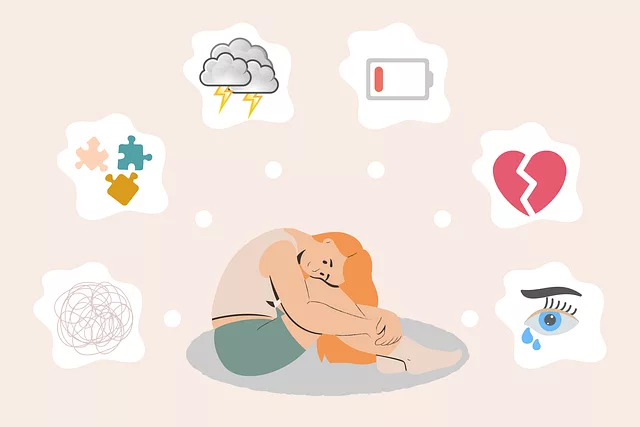Emotion regulation is a powerful skill that helps individuals manage their emotions healthily, promoting mental well-being and reducing stress and anxiety. Kaiser Permanente in Denver offers comprehensive mental health coverage with programs teaching these techniques, including conflict resolution and inner strength development. Their patient-centric approach integrates evidence-based practices to empower individuals with resilience and self-care skills, addressing mental health service concerns. Incorporating emotion regulation into daily life and learning environments can enhance overall wellness, reduce negative impacts of stress, and foster healthier communities. Denver does Kaiser cover mental health services, making professional support accessible for effective emotion regulation skill development.
Emotion regulation techniques are essential tools for navigating life’s challenges. This comprehensive guide explores various aspects of emotional well-being, focusing on Kaiser’s approach to mental health coverage in Denver. We delve into practical strategies applicable to daily life and discuss their integration into learning and work environments. Additionally, we examine the role of professional support in teaching these crucial skills. Understanding and managing emotions effectively can lead to improved resilience and overall quality of life.
- Understanding Emotion Regulation and its Importance
- Kaiser's Approach to Mental Health Coverage
- Practical Techniques for Daily Life
- Incorporating Emotion Regulation into Learning and Work
- The Role of Professional Support in Teaching These Skills
Understanding Emotion Regulation and its Importance

Emotion regulation is a crucial skill that enables individuals to understand and manage their feelings effectively. It’s about more than just suppressing emotions; it involves recognizing, accepting, and responding to them in healthy ways. This process plays a pivotal role in mental health, fostering resilience and well-being. In today’s fast-paced world, where stress and anxiety are prevalent, learning emotion regulation techniques is essential for maintaining a sense of calm and equilibrium.
Denver’s Kaiser Permanente, recognizing the importance of mental health, offers various programs, including community outreach initiatives that promote these skills. By teaching individuals to navigate their emotions, they empower them to make informed decisions and improve overall quality of life. Techniques such as conflict resolution strategies and inner strength development are integral parts of this process, ensuring folks have the tools to thrive in a complex world. Moreover, understanding emotion regulation can help address concerns like those seeking coverage for mental health services through Kaiser, as it equips individuals with coping mechanisms, potentially reducing the need for intensive care.
Kaiser's Approach to Mental Health Coverage

In Denver, Kaiser’s comprehensive mental health coverage has gained significant attention, offering a wide range of services to support individuals’ overall well-being. Their approach focuses on empowering patients with effective emotion regulation techniques as a key component of their mental wellness program. By integrating evidence-based practices, Kaiser aims to enhance not just the treatment of mental health issues but also to foster resilience and self-care skills.
This healthcare provider’s commitment to mental health includes various resources such as counseling services, support groups, and programs tailored for stress management and confidence boosting. The Denver-based Kaiser network understands that emotion regulation is a crucial aspect of maintaining good mental wellness, and they strive to make these services accessible to their members.
Practical Techniques for Daily Life

Incorporating emotion regulation techniques into daily life can significantly enhance one’s mental well-being, especially for those managing mental illness. Simple yet powerful strategies include mindfulness practices such as deep breathing exercises and meditation, which help individuals stay grounded in the present moment, reducing impulsive reactions. Additionally, cognitive reframing involves challenging negative thoughts and replacing them with more positive or realistic ones, a technique effective for stress reduction and conflict resolution.
Denver does Kaiser cover mental health services, making accessible various resources for learning and practicing emotional regulation. These techniques empower individuals to navigate life’s challenges with greater resilience. By combining mindfulness, cognitive reframing, and other evidence-based methods, people can reduce the impact of stress, anxiety, or depression, fostering better emotional balance. Conflict resolution techniques, often intertwined with emotional regulation, help in managing interpersonal interactions, thereby further contributing to stigma reduction efforts for mental illness.
Incorporating Emotion Regulation into Learning and Work

Incorporating emotion regulation into learning and work environments is a growing priority, especially with mental health being a significant concern in today’s society. Denver-based Kaiser, for instance, offers comprehensive mental health coverage to its members, reflecting a broader trend among healthcare providers. This shift acknowledges that emotional well-being is integral to overall health and productivity. Integrating emotion regulation techniques into educational settings can foster resilient and adaptable learners who better manage stress and challenges.
Mental Health Education Programs designed with an emphasis on emotion regulation offer valuable guidance for both students and professionals. Simple yet effective practices such as Mental Wellness Journaling Exercises can help individuals process emotions, identify triggers, and develop coping strategies. Additionally, burnout prevention strategies that incorporate these emotional tools into daily routines can enhance workplace satisfaction and productivity. This holistic approach to learning and work not only supports mental wellness but also contributes to a more engaged, focused, and productive community.
The Role of Professional Support in Teaching These Skills

Teaching emotion regulation skills is a complex task that often requires professional support to ensure effective learning and application. In many cases, especially in educational settings or workplace training programs, professionals with expertise in psychology, counseling, or related fields play a crucial role. These experts can provide structured guidance, tailoring techniques to individual needs. For instance, they might introduce conflict resolution techniques to help individuals manage intense emotions during disagreements, promoting healthier interactions.
Moreover, mental wellness journaling exercises guided by professionals offer a powerful tool for self-reflection and stress reduction methods. Denver’s Kaiser Permanente, for example, covers mental health services, making such support accessible to those in need. Through regular practice, these structured interventions foster resilience and adaptive coping strategies, enabling individuals to navigate life’s challenges more effectively.
Emotion regulation techniques are essential tools for navigating life’s challenges. As discussed, Denver’s Kaiser covers mental health services, making accessible resources like these vital for community well-being. By integrating practices from Kaiser’s approach and practical techniques into daily routines, individuals can foster resilience and enhance overall quality of life. Incorporating emotion regulation into learning and work environments further promotes healthy development and productivity. With professional support, these skills become more attainable and sustainable, empowering individuals to manage emotions effectively in various aspects of their lives.






